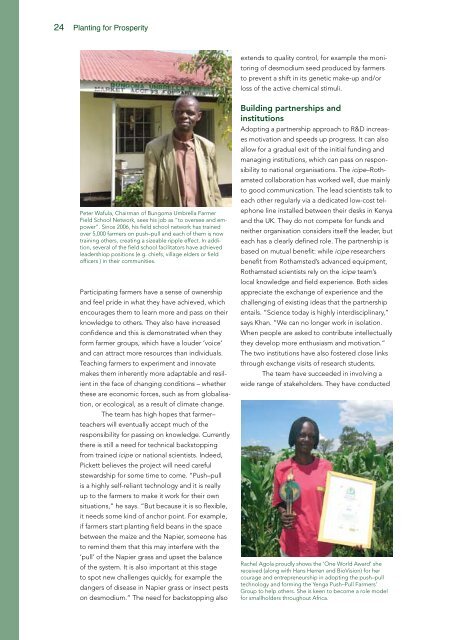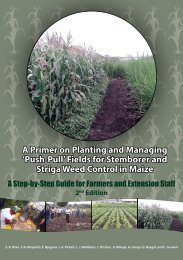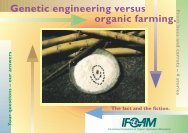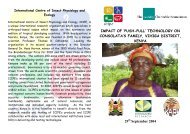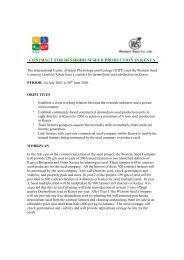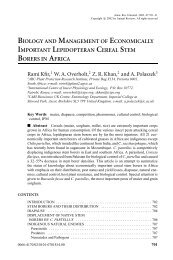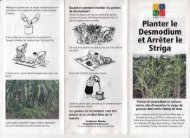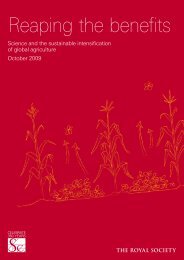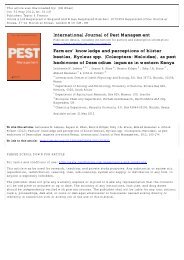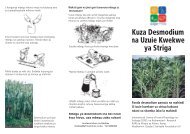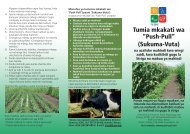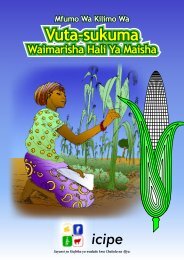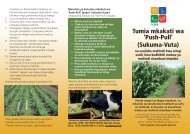a model for Africa's green revolution - Push-Pull
a model for Africa's green revolution - Push-Pull
a model for Africa's green revolution - Push-Pull
You also want an ePaper? Increase the reach of your titles
YUMPU automatically turns print PDFs into web optimized ePapers that Google loves.
24 Planting <strong>for</strong> Prosperity<br />
extends to quality control, <strong>for</strong> example the monitoring<br />
of desmodium seed produced by farmers<br />
to prevent a shift in its genetic make-up and/or<br />
loss of the active chemical stimuli.<br />
Peter Wafula, Chairman of Bungoma Umbrella Farmer<br />
Field School Network, sees his job as “to oversee and empower”.<br />
Since 2006, his field school network has trained<br />
over 5,000 farmers on push–pull and each of them is now<br />
training others, creating a sizeable ripple effect. In addition,<br />
several of the field school facilitators have achieved<br />
leadershiop positions (e.g. chiefs, village elders or field<br />
officers ) in their communities.<br />
Participating farmers have a sense of ownership<br />
and feel pride in what they have achieved, which<br />
encourages them to learn more and pass on their<br />
knowledge to others. They also have increased<br />
confidence and this is demonstrated when they<br />
<strong>for</strong>m farmer groups, which have a louder ‘voice’<br />
and can attract more resources than individuals.<br />
Teaching farmers to experiment and innovate<br />
makes them inherently more adaptable and resilient<br />
in the face of changing conditions – whether<br />
these are economic <strong>for</strong>ces, such as from globalisation,<br />
or ecological, as a result of climate change.<br />
The team has high hopes that farmer–<br />
teachers will eventually accept much of the<br />
responsibility <strong>for</strong> passing on knowledge. Currently<br />
there is still a need <strong>for</strong> technical backstopping<br />
from trained icipe or national scientists. Indeed,<br />
Pickett believes the project will need careful<br />
stewardship <strong>for</strong> some time to come. “<strong>Push</strong>–pull<br />
is a highly self-reliant technology and it is really<br />
up to the farmers to make it work <strong>for</strong> their own<br />
situations,” he says. “But because it is so flexible,<br />
it needs some kind of anchor point. For example,<br />
if farmers start planting field beans in the space<br />
between the maize and the Napier, someone has<br />
to remind them that this may interfere with the<br />
‘pull’ of the Napier grass and upset the balance<br />
of the system. It is also important at this stage<br />
to spot new challenges quickly, <strong>for</strong> example the<br />
dangers of disease in Napier grass or insect pests<br />
on desmodium.” The need <strong>for</strong> backstopping also<br />
Building partnerships and<br />
institutions<br />
Adopting a partnership approach to R&D increases<br />
motivation and speeds up progress. It can also<br />
allow <strong>for</strong> a gradual exit of the initial funding and<br />
managing institutions, which can pass on responsibility<br />
to national organisations. The icipe–Rothamsted<br />
collaboration has worked well, due mainly<br />
to good communication. The lead scientists talk to<br />
each other regularly via a dedicated low-cost telephone<br />
line installed between their desks in Kenya<br />
and the UK. They do not compete <strong>for</strong> funds and<br />
neither organisation considers itself the leader, but<br />
each has a clearly defined role. The partnership is<br />
based on mutual benefit: while icipe researchers<br />
benefit from Rothamsted’s advanced equipment,<br />
Rothamsted scientists rely on the icipe team’s<br />
local knowledge and field experience. Both sides<br />
appreciate the exchange of experience and the<br />
challenging of existing ideas that the partnership<br />
entails. “Science today is highly interdisciplinary,”<br />
says Khan. “We can no longer work in isolation.<br />
When people are asked to contribute intellectually<br />
they develop more enthusiasm and motivation.”<br />
The two institutions have also fostered close links<br />
through exchange visits of research students.<br />
The team have succeeded in involving a<br />
wide range of stakeholders. They have conducted<br />
Rachel Agola proudly shows the ‘One World Award’ she<br />
received (along with Hans Herren and BioVision) <strong>for</strong> her<br />
courage and entrepreneurship in adopting the push–pull<br />
technology and <strong>for</strong>ming the Yenga <strong>Push</strong>–<strong>Pull</strong> Farmers’<br />
Group to help others. She is keen to become a role <strong>model</strong><br />
<strong>for</strong> smallholders throughout Africa.


